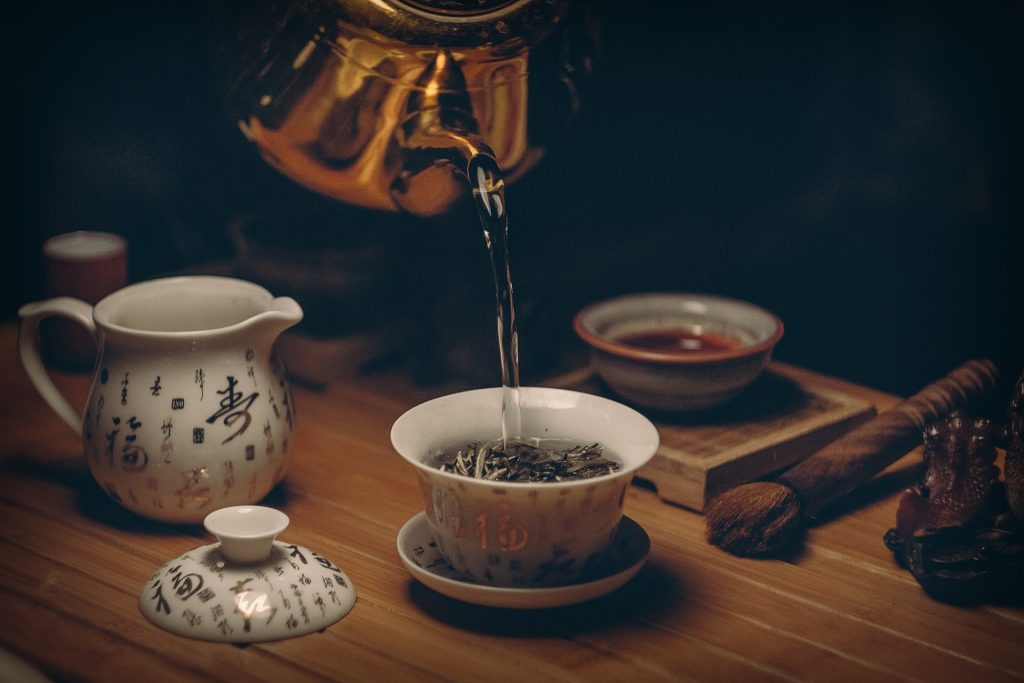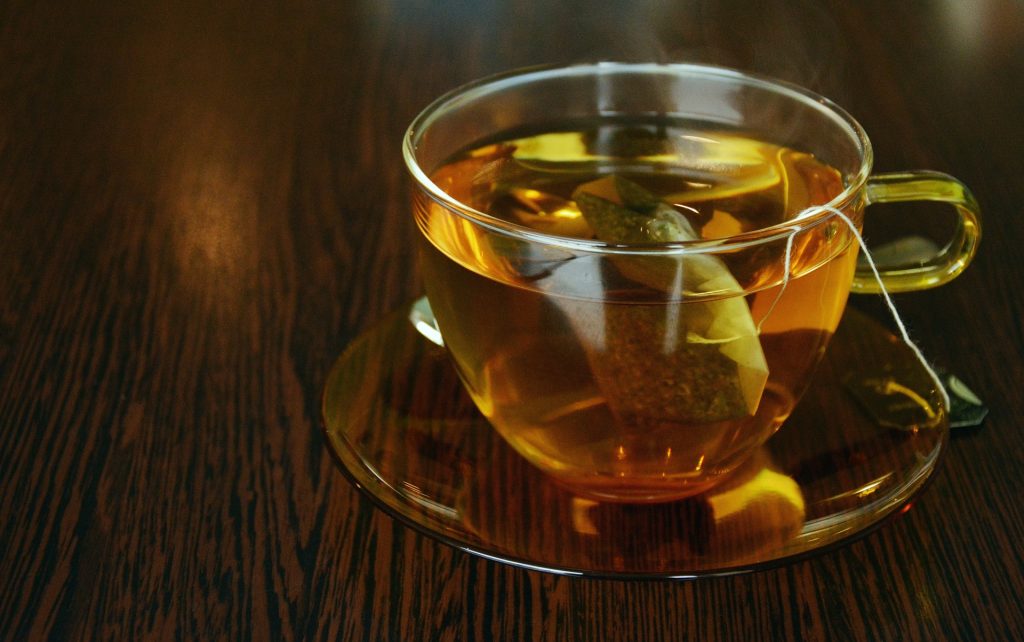 L-theanine is an amino acid found mainly in the leaves of the tea plant (Camelia sinensis). Both black and green tea are good sources of L-theanine. The dry weight of tea leaves is thought to be about 1-2 % L-theanine. A single cup of tea may therefore supply somewhere around 50 mg of the amino acid. Studies suggest that L-theanine may have neuroprotective effects. This effect may occur because L-theanine is able to antagonise excitatory neurotransmitter systems. In particular L-theanine is similar in shape to the excitatory neurotransmitter glutamic acid. L-theanine is associated with an increase in GABA levels, a decrease in norepinephrine levels, alterations to serotonin levels in particular parts of the brain, an increase in dopamine levels and a decrease in glutamate uptake. L-theanine crosses the blood brain barrier in a dose dependent manner within 30 min of consumption, reaching maximum concentrations in the brain 5 hours after ingestion. When in the brain L-theanine can influence the central nervous system.
L-theanine is an amino acid found mainly in the leaves of the tea plant (Camelia sinensis). Both black and green tea are good sources of L-theanine. The dry weight of tea leaves is thought to be about 1-2 % L-theanine. A single cup of tea may therefore supply somewhere around 50 mg of the amino acid. Studies suggest that L-theanine may have neuroprotective effects. This effect may occur because L-theanine is able to antagonise excitatory neurotransmitter systems. In particular L-theanine is similar in shape to the excitatory neurotransmitter glutamic acid. L-theanine is associated with an increase in GABA levels, a decrease in norepinephrine levels, alterations to serotonin levels in particular parts of the brain, an increase in dopamine levels and a decrease in glutamate uptake. L-theanine crosses the blood brain barrier in a dose dependent manner within 30 min of consumption, reaching maximum concentrations in the brain 5 hours after ingestion. When in the brain L-theanine can influence the central nervous system.

L-theanine appears to have particular positive effects on cognition. In particular, it may be able to increase the alpha wave state of the brain. This may have a relaxing and calming effect. A typical cup of tea contains around 50 mg L-theanine, and studies show that a single dose of this amount may be relaxing. Studies using higher amounts, typically 200 to 400 mg per day over a number of weeks have shown positive effects at causing relaxation and reducing anxiety in human subjects. Regular consumption of tea, or the use of L-theanine supplements may therefore be beneficial to those with mild to moderate anxiety. A cup of tea during a panic attack may also be beneficial.
The overall neurotransmitter effects of L-theanine are complex, but they appear to have beneficial effects on levels of calmness in humans. In particular, L-theanine may have particularly beneficial effects against anxiety in humans on account of its ability to stimulate the alpha-wave state brain activity. This state of brain activity is associated with wakeful calmness. For example, in one study researchers assessed the effects of L-theanine (200 mg) or the benzodiazepine drug alprazolam (1 mg) on anxiety in humans. The results showed that L-theanine was able to cause a significant improvement in the tranquility felt by the subjects in a recognised clinical mood scale. However alprazolam did not have this effect. At lower doses found in single a cup of tea (~50 mg), L-theanine has been shown to possess the ability to increase alpha wave state in the brain. Therefore at realistic dietary levels, L-theanine can have a significant effect on mental state and alertness.

Despite the presence of caffeine in tea, a cup of tea has calming properties. This calming effect of tea is due to the high amounts of the amino acid L-theanine.
In another study, patients with schizophrenia were administered 400 mg per day of L-theanine or a placebo for 8 weeks. The results showed that L-theanine produced a significant reduction is the anxiety symptoms experienced by the subjects. There was also a general improvement in the mental symptoms of the patients. The L-theanine in this case was given alongside the medication already being taken by the subjects. In another study, subjects took 200 mg of L-theanine in a single dose and then performed a task designed to cause stress. The results of the study showed that the L-theanine significantly decreased the stress experienced by the subjects, including a reduction in heart rate and a decrease in the levels of stress hormones. In another study, students were administered 200 mg L-theanine twice per day for 10 days during a period of stress at university. The L-theanine significantly reduced the initial stress response of the students compared to the placebo, the authors suggesting that anxiety had been reduced by the L-theanine.
Eat Well, Stay Healthy, Protect Yourself
RdB
